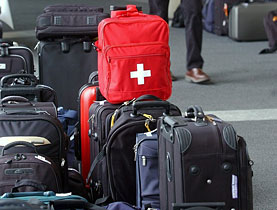Record number of Swiss tourists take flight

Following years of stagnation, Switzerland has posted the largest increase since 1992 in the number of people who count themselves as travellers.
A study released by the Institute for Public Services and Tourism at St Gallen University said that while Swiss tourists are increasingly holidaying abroad, domestic travel remained most popular.
Some 88 per cent of people took at least one overnight trip in 2007, the study revealed. Around 1,900 households were surveyed.
Switzerland remained the top destination for Swiss people, holding a 39 per cent market share in 2007 – a four per cent decrease since the last survey, conducted in 2004.
The country’s legendary winter season has for years driven the domestic tourism market, and researchers found that Swiss stuck around during the spring and autumn seasons too, depending on the weather.
On the whole, a robust economic climate, shifting demographics and a range of choices and prices are behind the 2007 figures, said Christian Laesser, a professor at St Gallen University and one of the study’s lead authors.
“There was a favourable economic framework in terms of a low unemployment rate, solid incomes and very good consumer sentiment,” he told swissinfo. “We had a large group of people now close to retirement, where normally travel propensity is higher than in any other group.”
“There were a lot of options and opportunities in terms of where you could fly at what price,” he added.
Spreading their wings
One-quarter of passengers travelled to countries overseas or not bordering Switzerland, and around the same percentage travelled by aircraft. The number of people travelling by car dropped, while railways held a 16 per cent market share, an increase over 2004.
Some 70 per cent of trips lasted a maximum of one week, while ten per cent were longer than three weeks.
The most frequent travellers were those who lived in urban areas, had relatively small households, were well educated and working in white collar positions, researchers said.
Swiss travellers conducted much of their own research and planning, the study’s authors wrote. Most people turned to family, friends and the internet for advice and around 70 per cent of all trips were taken independently, a high proportion compared with the rest of Europe.
The emergence of low-cost airlines in Europe and around the world has changed the game for both travellers and the industry. “Travel has become a commodity,” Laesser said.
End of cheap flying
But by the same token, the rise in the price of fuel has had a strong effect on the availability of seats and their price. Globally, airlines are expected to cut some 60 million seats during the Christmas season.
This week, the global price of jet fuel fell to $135.70 (SFr149.30) per barrel, according to the International Air Travel Association (IATA). While that figure is over 20 per cent lower than just one month ago, it is still 57 per cent higher than one year ago.
The year’s average of $142.30 per barrel has made it $91 billion more expensive to travel since January, IATA says.
The low-cost seats, which had made flying accessible to an entire segment of people previously outside the market, will be hardest hit. “They [the seats] will evaporate,” Laesser said. The people are expected to stay home.
People with more money, on the other hand, are expected to continue travelling. Their routes – Zurich to Sydney, for example – are relatively less affected by the cost of fuel than people flying low-cost, and the demand for seats is less elastic. Their travel decisions are subject to influences and relationships developed in their professional lives.
“About 20 per cent of all travel is driven by fostering social networks and this has been increasing for quite some years now. People are travelling to meet with other people,” Laesser said. He predicts this trend will grow as people work increasingly away from home.
The next survey will be released in 2010.
swissinfo, Justin Häne
Switzerland, with its 7.5 million people, is not large enough to dominate any particular travel destination, although Laesser told swissinfo that Swiss travellers are loyal.
Most, while considered adventurous, are repeat visitors, he says.
For example, some 70 per cent of Swiss travellers to Western Australia have been there before.
Overall, more tourists stay closer to home, preferring to travel to neighbouring countries.
The Swiss like their comfort. A quarter of all Swiss travellers last year stayed in four and five star hotels, up 7 per cent on the previous year.

In compliance with the JTI standards
More: SWI swissinfo.ch certified by the Journalism Trust Initiative











You can find an overview of ongoing debates with our journalists here . Please join us!
If you want to start a conversation about a topic raised in this article or want to report factual errors, email us at english@swissinfo.ch.